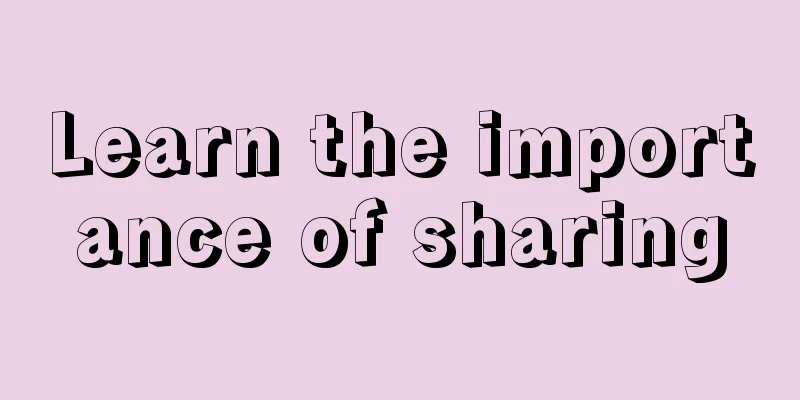Learn the importance of sharing

|
The Chinese nation has been a humble and friendly nation since ancient times. Since ancient times, there have been many poems about enthusiasm, friendship and mutual assistance. In ancient times, people admired humble gentlemen who were filial and respectful, and loved their parents and brothers. The story of Kong Rong giving away his pears has been passed down from ancient times to the present day. It not only reflects the importance of respecting the elderly and loving the young, but also teaches people to learn to share. Sharing is a virtue and a great love. People who share can love themselves and others better. The ancients said, "If you want a tree to grow tall, you must strengthen its roots; if you want a river to flow far, you must dredge its source." Before solving the problem of sharing, we need to understand, clarify and analyze the causes so that we can prescribe the right medicine. In this regard, the author has made a careful analysis and summary, and there are mainly three points: 1. Lack of confidence in yourself. Friends who hold this kind of mindset can fully realize the importance and necessity of sharing, and have the original intention and desire to share, but they lack confidence in sharing. They one-sidedly believe that sharing is not an easy thing, and only those big Vs, big names, and successful people are qualified and capable of sharing. As an unknown person and a guinea pig on the Internet, I have very little knowledge in my head and can only listen attentively. If you share your little knowledge, it would be strange if people don't laugh their heads off. Why bring shame upon yourself? ! What they don’t know is that no gold is pure, no one is perfect, everyone has his or her own strengths and weaknesses, and as long as you are willing to explore and show them, everyone has his or her own shining points. 2 Afraid of being surpassed. This phenomenon is very common, especially when the person you are sharing with is in the same industry as you. You are afraid that your years of experience and skills will be learned by others and take away your job. It is like the story of the master and apprentice of the cat and the tiger. You must "keep one trick up your sleeve", otherwise you will die miserably. Some people would rather keep their flaws than show them to others. This is a typical bondage of old feudal ideas, which shows how profound the feudal malpractices of thousands of years have affected our nation. What they don’t know is that in today’s age where Internet information updates in seconds and innovation is everywhere at all times, everything is possible. Do you think you can stay out of it, hide it, and keep it to yourself? Maybe you think it is a treasure today, but it may become worthless tomorrow.
|
<<: How to identify the authenticity of medical stone pot
>>: Does moldy bean curd need to be cleaned?
Recommend
What to do if your feet are dry and rough
In life, most people pay more attention to the sk...
Recipes for three kinds of health tea
When drinking tea, drink health-preserving tea. A...
Does intestinal cancer cause fever? What are the symptoms?
Does bowel cancer cause fever? What are the sympt...
How can patients with nasopharyngeal carcinoma prevent recurrence
Various diseases emerge in our lives, often catch...
What are the commonly used Chinese patent medicines for lung cancer? Introduction to four lung cancer cryotherapy methods
Commonly used Chinese patent medicines for lung c...
Why does my right side of the head hurt, and my eye and eye socket hurt, and half of my face hurts?
If you often feel eye pain or it spreads to the w...
Treatment methods for lumbar fractures, treatment and care are the most important
In the event of a lumbar fracture, a reasonable t...
What harm does nitrite do to the human body
Nitrite is a chemical raw material and a common i...
Family inheritance of esophageal cancer
There is a familial clustering phenomenon in the ...
How to digest quickly
Many people have experienced hunger. I believe th...
What are the early symptoms of colorectal cancer metastasis to bone cancer
The metastasis of colorectal cancer to bone cance...
How to make canned peaches
In life, many people prefer to eat canned food, b...
How to remove oil stains from white clothes
When other colors appear on white, it looks very ...
What kind of tea is effective in reducing internal heat?
If you often eat foods with a lot of chili pepper...
Is 1C stage III ovarian cancer considered early stage?
1C stage III ovarian cancer is not early stage, b...









